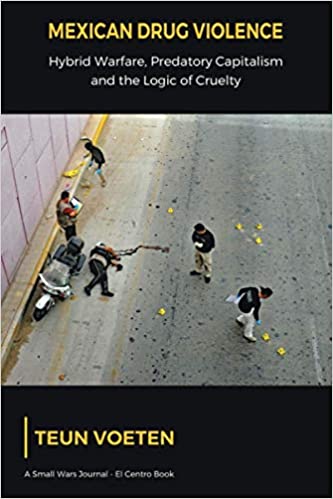 Veteran war photographer Teun Voeten has worked in conflict zones from Afghanistan and Iraq to Rwanda and Sierra Leone, to Haiti, Nicaragua and Colombia. Now he makes the leap into academia, with his newly published doctoral thesis, Mexican Drug Violence: Hybrid Warfare, Predatory Capitalism and the Logic of Cruelty. Voeten attempts to provide a theoretical framework for the unrelenting cartel wars that may now threaten an actual collapse of the government in the United States' southern neighbor.
Veteran war photographer Teun Voeten has worked in conflict zones from Afghanistan and Iraq to Rwanda and Sierra Leone, to Haiti, Nicaragua and Colombia. Now he makes the leap into academia, with his newly published doctoral thesis, Mexican Drug Violence: Hybrid Warfare, Predatory Capitalism and the Logic of Cruelty. Voeten attempts to provide a theoretical framework for the unrelenting cartel wars that may now threaten an actual collapse of the government in the United States' southern neighbor.
Voeten examines the works of the 19th century Prussian general Carl von Clausewitz, who posed a "tripartite" model of the dynamics of warfare, in which the principal actors are the state, the army and the people. This was updated after World War II by the Israeli scholar Martin van Creveld, who saw these actors breaking down as discrete categories in modern warfare. Voeten poses his "hybrid warfare" as a new model, in which ostensibly non-state actors such as the notorious Zetas actually take on certain aspects of state entities, while employing "ultraviolence" to intimidate the populace.
Voeten sees the first eruption of true warfare in 2004, when the Sinaloa Cartel moved in on the eastern turf of the Gulf Cartel, precipitating street shoot-outs in Nuevo Laredo. In 2005, the Zetas emerged as a paramilitary offshoot of the Gulf Cartel and began the push-back, taking the war to the Sinaloa Cartel's traditional turf in Mexico's west. In 2006, President Felipe Calderón mobilized the army to fight (primarily) the Zetas, which only escalated the level of violence. In 2008, the main theater of war shifted to Ciudad Juárez, where the Sinaloa Cartel moved to usurp the traditional stronghold of the Juárez Cartel, finally emerging victorious after a three-year bloody struggle. Juárez in this period overtook Baghdad and Mogadishu as the most violent city on the planet.
President Andrés Manuel López Obrador took office in 2018 with idealistic talk of de-escalation, promising "hugs not bullets." But things have not de-escalated. The Sinaloa Cartel's subsidiary entities to the south of its main turf have splintered from their parent organization and each other, opening yet another theater of war in Michoacán and Jalisco. Voeten notes that some scholars are now warning that Mexico could become a "failed state."
Voeten is most useful in the global perspective he brings to Mexico's nightmare. He insightfully compares the Zetas to ISIS, noting how both operate on a "franchise" model and arguing that both provide exemplars of "hybrid warfare."
In looking to the roots of the crisis, Voeten may be over-reacting to the tendency among progressives to blame everything on "neoliberalism," and to argue that poverty "causes" crime. If these dictums are oversimplified, so may be Voeten's attempted correctives. He poses the cartels as "ultra-capitalist predatory corporations." While Clausewitz saw war as a "continuation of politics by other means," for Mexico's cartels it is a "continuation of business by other means." But this can also be seen as an extension of the ethic of savage capitalism imposed by the neoliberal order—not something counterposed to it. It is hard to believe it is merely coincidental that Mexico went over the edge into internal war in the years after NAFTA pulled the economic rug out from under the country's workers and peasants.
It's also disappointing that Voeten does not look to legalization of (at least) cannabis as a means of (at least) beginning a de-escalation. We should by all means be skeptical of another round of easy-answer utopianism (whether it was sending in the army in 2006 or offering "hugs" in 2018). But Mexicans will soon have the opportunity to craft a legalization model that could, perhaps, just begin to move the country back from the brink...







Recent comments
2 weeks 5 days ago
2 weeks 5 days ago
5 weeks 6 days ago
6 weeks 5 days ago
10 weeks 5 days ago
14 weeks 4 days ago
18 weeks 4 days ago
19 weeks 2 days ago
29 weeks 2 days ago
33 weeks 3 days ago